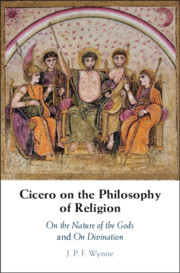Book contents
- Cicero on the Philosophy of Religion
- Cicero on the Philosophy of Religion
- Copyright page
- Dedication
- Contents
- Acknowledgments
- Abbreviations
- Introduction: Cicero and the Translation of Philosophy from Greece to Rome
- Chapter 1 Cicero’s Project in On the Nature of the Gods and On Divination
- Chapter 2 Velleius the Epicurean
- Chapter 3 Balbus the Stoic and Cotta the Skeptic
- Chapter 4 Quintus’ Stoic Case for Divination
- Chapter 5 Marcus’ Arguments against Divination
- Chapter 6 Marcus’ Stance on the Central Question
- Book part
- Bibliography
- General index
- Index locorum antiquorum
Chapter 2 - Velleius the Epicurean
Published online by Cambridge University Press: 27 September 2019
- Cicero on the Philosophy of Religion
- Cicero on the Philosophy of Religion
- Copyright page
- Dedication
- Contents
- Acknowledgments
- Abbreviations
- Introduction: Cicero and the Translation of Philosophy from Greece to Rome
- Chapter 1 Cicero’s Project in On the Nature of the Gods and On Divination
- Chapter 2 Velleius the Epicurean
- Chapter 3 Balbus the Stoic and Cotta the Skeptic
- Chapter 4 Quintus’ Stoic Case for Divination
- Chapter 5 Marcus’ Arguments against Divination
- Chapter 6 Marcus’ Stance on the Central Question
- Book part
- Bibliography
- General index
- Index locorum antiquorum
Summary
In Book 1 of Cicero’s On the nature of the gods, Velleius argues for an Epicurean theology and view of religion. Cotta, an Academic skeptic, argues against him. I argue that when we see Cicero’s creative hand adapting Epicurean texts like the On Piety found at Herculaneum and attributed to Philodemus, we find that Velleius’ speech may be understood as proceeding from our allegedly natural concept that the gods are eternal and happy. Velleius’ seemingly intemperate criticism of his opponents, that they are crazy, follows from his position that they have somehow gone against this natural concept. His positive view, which proceeds from the happiness or blessedness (beatitudo, beatitas, eudaimonia) of the gods, is that Roman religion may be reinterpreted as worship of gods who do not care about us at all, and thus are ideals for us of the hedonist life free from pain. Despite Cicero’s habitual contempt for Epicureanism, he paints an attractive picture of Velleius’ spirituality. But Cotta argues that by making the gods not care for us, Epicurus has torn out the heart from religion, since he has made gods who are (so Cotta argues) selfish and not worthy of worship or imitation.
- Type
- Chapter
- Information
- Cicero on the Philosophy of Religion<I>On the Nature of the Gods and On Divination</I>, pp. 83 - 110Publisher: Cambridge University PressPrint publication year: 2019

